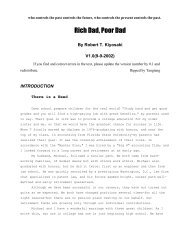Rich Dad, Poor Dad
You also want an ePaper? Increase the reach of your titles
YUMPU automatically turns print PDFs into web optimized ePapers that Google loves.
who controls the past controls the future, who controls the present controls the past.<br />
bigger, more flashy house we realize it would not be an asset, it would be a<br />
liability, since it would take money out of<br />
our pocket.<br />
So here is the argument I put forth. I really do not expect most people to<br />
agree with it because a nice home is an emotional thing. And when it comes to<br />
money, high emotions tend to lower financial intelligence. 1 know from personal<br />
experience that money has a way of making every decision emotional.<br />
1. When it comes to houses, I point out that most people work all their<br />
lives paying for a home they never own. In other words, most people buy a new<br />
house every so many years, each time incurring a new 30-year loan to pay off the<br />
previous one.<br />
2. Even though people receive a tax deduction for interest on mortgage<br />
payments, they pay for all their other expenses with after-tax dollars. Even<br />
after they pay off their mortgage.<br />
3. Property taxes. My wife's parents were shocked when the property taxes<br />
on their home went to $1,000 a month. This was after they had retired, so the<br />
increase put a strain on their retirement budget, and they felt forced to move.<br />
4 Houses do not always go up in value. In 1997, I still have friends who<br />
owe a million dollars for a home that will today sell for only $700,000.<br />
5. The greatest losses of all are those from missed opportunities. If all<br />
your money is tied up in your house, you may be forced to work harder because<br />
your money continues blowing out of the expense column, instead of adding to the<br />
asset column, the classic middle class cash flow pattern. If a young couple<br />
would put more money into their asset column early on, their later years would<br />
get easier, especially as they prepared to send their children to college. Their<br />
assets would have grown and would be available to help cover expenses. All too<br />
often, a house only serves as a vehicle for incurring a home-equity loan to pay<br />
for mounting expenses. In summary, the end result in making a decision to own a<br />
house that is too expensive in lieu of starting an investment portfolio early on<br />
impacts an individual in at least the following three ways:<br />
1. Loss of time, during which other assets could have grown in value.<br />
2. Loss of additional capital, which could have been invested instead of<br />
paying for high-maintenance expenses related directly to the home.<br />
3. Loss of education. Too often, people count their house, savings and<br />
retirement plan as all they have in their asset column. Because they have no<br />
money to invest, they simply do not invest. This costs them investment




